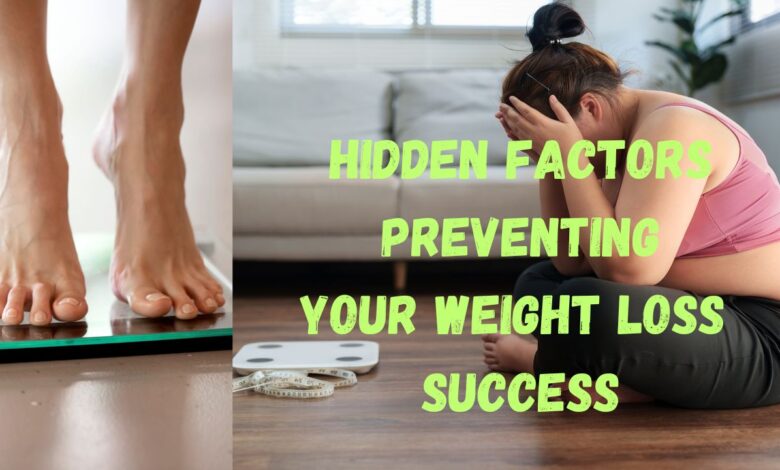

Weight Loss: This is why you’re not losing weight. Now, of course, the obvious reasons why people can’t lose weight are they’re eating too much food or maybe they’re just a couch potato.
Those are the obvious things. And then you also have people who are on a healthy version of the ketogenic diet, doing intermittent fasting, and even they plateau. Today, you’re going to learn the not-so-obvious things that are keeping you from achieving your weight loss goals.
Table of Contents
Insulin: The Heart of the Problem
Insulin is at the heart of the problem with slow metabolism. Your body can always lose to that point, but then getting further is a problem. That’s because of insulin. Insulin is triggered by sugar and other things that are hidden sugars.
If you look at, for example, this product, it has zero sugars, this one has zero sugars, and so does this one too. But wait a second, doesn’t it have any sugar? Well, it has carbohydrates, and it doesn’t have a lot of fiber, so what’s left? Starches.
It’s basically a string of sugars connected together, and because it’s so processed, it’s going to act not just like sugar but worse than sugar on the glycemic index. So, it’s going to spike your sugar a lot higher and cause even more weight gain than something like cane sugar.
Cane sugar itself on the glycemic index is around 74 or 75, but the starches in junk food can go above 100, and maltodextrin can go up to 185. So even though it’s not called a sugar, we’re just going to call it sugar because it acts like a sugar.
Hidden Insulin Triggers
Another hidden one is seed oils. Seed oils can cause a problem with insulin to the point where you gain a lot of weight. Stress and a lack of sleep can also slow weight loss. This is why when you don’t sleep well, you might crave the wrong foods or be extra hungry. If you really want to do a good demo, check your blood sugars after a night that you haven’t slept; you’re going to see them way off.
Frequent meals and snacking are devastating for insulin because every time you eat anything, you increase insulin.
Improving Insulin Sensitivity
What do we do to fix this insulin issue? How do we lower insulin and make it work better? It’s called insulin sensitivity.
Reduce Sugars and Starches: The first step is to reduce your sugars and starches.
Cut Out Snacks: Start to not eat frequently. Cut out snacks.
Exercise: Of course, this is the obvious one.
Get More Sleep: Getting more sleep is also important.
Other Not-so-Obvious Factors
Even a piece of bread, for example, can bump you out of fat burning for a lot longer than you might think because it takes some time to get into ketosis. It could take 24 to 48 hours. Let’s say, for example, you’re in ketosis and then you drink a glass of wine. The next night, you have a piece of bread. You’re just not going to be in ketosis. Why? Because it takes you a lot longer to get into ketosis. It’s very easy to bump you out, but it takes longer to get you in because the body is adapting, and that takes some time.
The next one is it’s actually working, and you don’t know it. You think it’s not working because you’re looking at the scale, and it’s not budging. It’s not “lose weight to get healthy”; it’s “get healthy to lose weight.” So, when you start cutting down carbs and burning your own fat, your body is in a healing mode. You’re going from a kind of blood sugar diabetic area to a healthier area. There are really just two things to look at:
Hunger Levels: Did your hunger go away?
Energy Levels: Is your energy level high? If your energy level is high, that means you’re using fat as energy. Those two things mean that it is working, and you just need to give it more time.
Overtraining and Sleep
Another point is overtraining. I’ve had people who exercise too much with not enough rest, and all we did was give them more rest. We took that high-intensity exercise program and spaced it out more so there was more rest, and that worked.
Importance of Sleep
Getting enough sleep is really important. I had one lady who came in; she lifted, I think, it was 3 million pounds at the gym over the course of a year. She worked out every other day with her friend, and I think she lost one pound in a whole year. Then I found out she had terrible sleep. I helped her with her sleep, and she started losing a lot of weight, over 20 pounds.
Medications and Supplement
Medications like anti-depressive medication and antibiotics can also block your ability to lose weight. Another way to reduce insulin is called berberine. It decreases inflammation and even gets the mitochondria to work a lot better. It does a lot more, but just realize that it’s going to be really good for helping you lose weight
Apple cider vinegar, one tablespoon per glass of water, sip it with a straw to make sure that you don’t get all this acid on your teeth.
There are certain nutrients that help reduce insulin. The most important one is vitamin D. At least 10,000 IUs every single day, but if you’re out in the sun for at least a half hour, you’re getting 20,000 IUs. So, it’s either sun or a combination of food and supplements to get your vitamin D.
Diet and Fasting Recommendations
Of course, the obvious thing too is to go on a healthy version of the ketogenic diet, lower carb, and at the same time do intermittent fasting. But I need to explain what type of fasting I would recommend, especially if you’re having a problem losing weight.
Most people do a pattern of 16 hours fasting with an 8-hour eating window, and I do recommend it at first. But after you do this fasting and get used to it, and your body adapts and you’re eating healthy, you want to go to an 18-hour fasting with a 6-hour eating window, and then eventually maybe a 23-hour fasting with a 1-hour eating window, so you’re doing OMAD (One Meal A Day).
Dry Fasting
Then I’m going to recommend something called dry fasting. Don’t eat or drink from sunrise to sunset. Now, that’s roughly about 12 hours, and if you did 12 hours of dry fasting, you’re going to burn more fat. You trigger all sorts of genes that help you survive. Fat doesn’t have a lot of water in it, maybe 1 to 3%, but fat can create water when it’s burned with oxygen, especially if you don’t give your body as much water. Then graduating into even 24 hours occasionally.
Also Read:The Dark Side of Fitness: Risk of Excessive Exercise
Conclusion
So, let’s say today you’re going to hydrate very well, and then at 6:00 PM, no food, no water. Then you go to sleep tonight, wake up in the morning at 6:00 AM, that’s 12 hours. You’re dry fasting as well. You’re not eating or drinking all the way until 6:00 PM, where you have your first meal, and then you can start drinking water. That gives you 24 hours. That’s a pretty darn good dry fast, and you’re going to notice some really good changes with that.
We hope you found this information helpful in understanding the hidden factors that might be affecting your weight loss journey. If you have any questions, experiences to share, or thoughts about this topic, please leave a message in the comments section below. We’d love to hear from you and engage in a meaningful conversation




